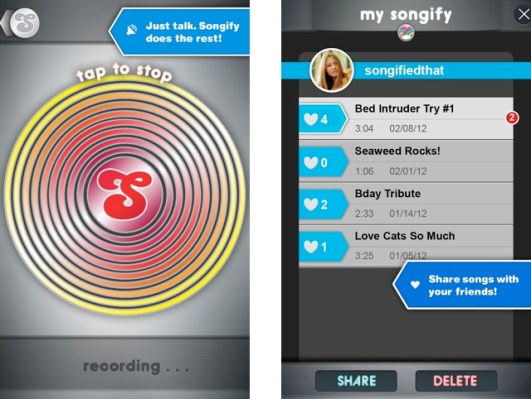Smule has been churning out scores of popular music-making iOS apps for years now, but they’ve been notoriously gun-shy about bringing those apps to other platforms.
As of today though, that streak has finally come to an end — the company has just released their auto-tuning Songify app into the Google Play Store.
Originally developed by Khush (whom Smule acquired toward the end of last year), Songify turns user-recorded speech into surprisingly listenable songs by tuning those voice inputs to go along with preset background music. The iOS version peaked at #1 on Apple’s Top Free Apps chart shortly after its launch in July 2011, and Smule now hopes for similar success as it expands into new territory.
For a while though, it seemed like this day would never come. Late last year, Smule co-founder and CTO Ge Wang told InsideMobileApps that Android app development was under consideration by the company, but issues of audio latency in certain devices meant that not every user would have a consistently solid musical experience. Though company representatives are quick to note that latency is becoming less of an issue over time, Songify sort of side-steps that issue because it doesn’t rely on instantaneous audio feedback like some of Smule’s other apps (say, Ocarina for example).
Still, that didn’t stop the company from testing the waters ahead of today’s official launch. A preview version of Songify was recently published in the Google Play Store to generally positive reviews, though they did point to a few issues that were addressed in the final build.
So what’s next for the team at Smule? In case Songify doesn’t provide you with quite enough musical mirth, Smule has also revealed that their Magic Piano app is set to make its Android debut in just a few weeks, though it too is currently available in preview form for those who just can’t wait.
For now though, Smule is content to hunker down on Android and iOS — company representatives confirmed (again) that expansion into platforms like Windows Phone isn’t in the works at this time.
